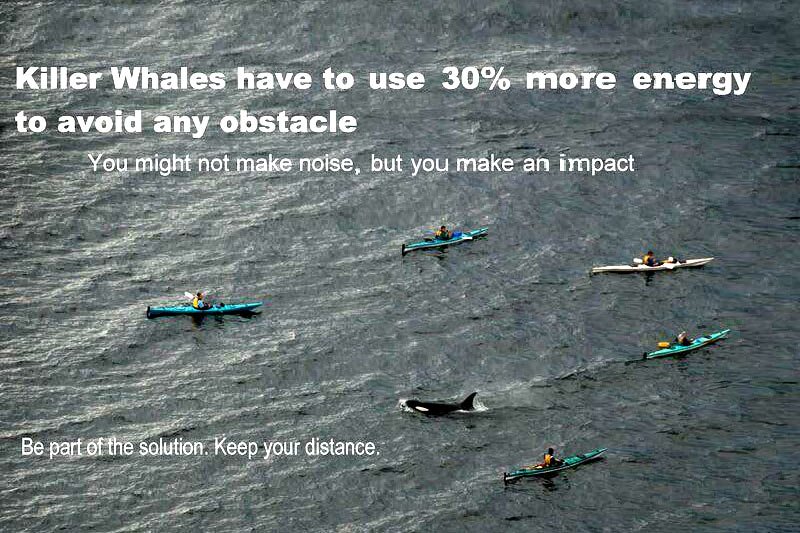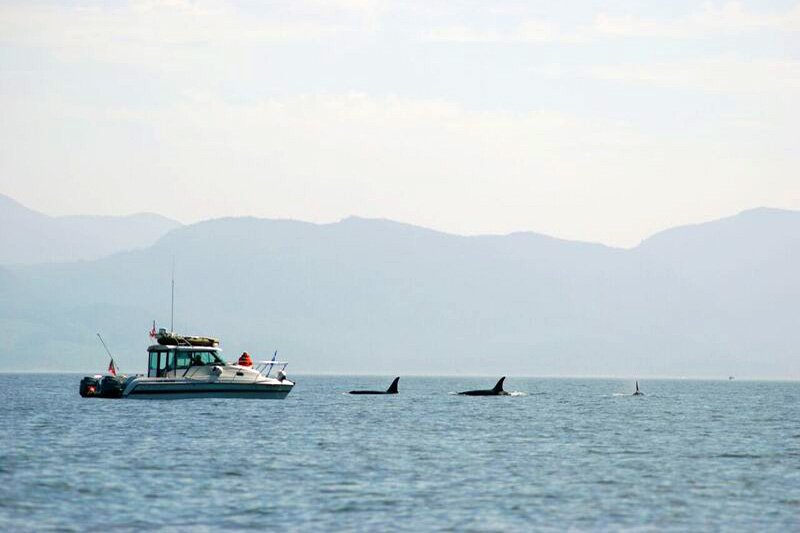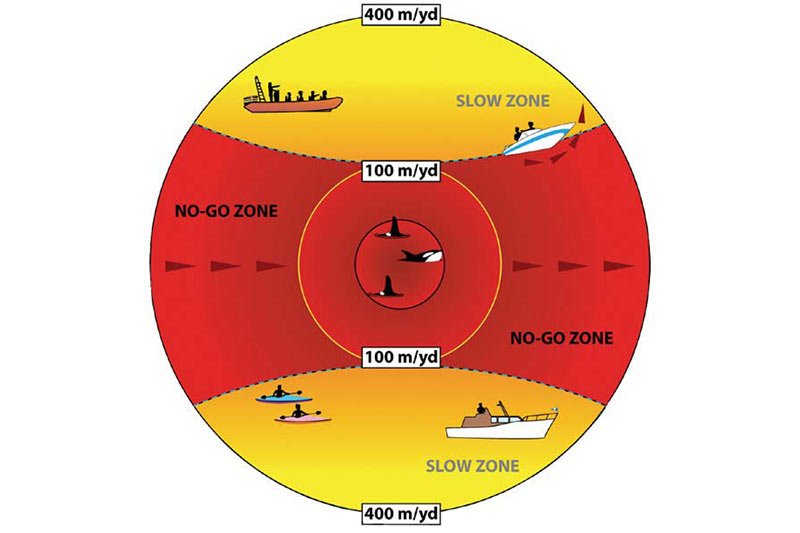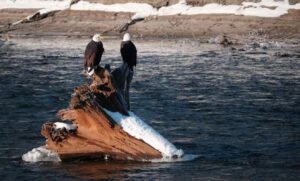
Being “whale wise” is one of the most important ways boaters, kayakers, and other mariners can help BC’s vulnerable whales. By following the Be Whale Wise Guidelines, mariners can profoundly diminish the negative impact their presence on the water has on whales and other marine mammals. The guidelines advise sound and sensible etiquette and responsible behaviour for boaters while on the water, particularly when in the vicinity of whales and other marine mammals.
The guidelines advocate the minimum distance — 100 metres — to be kept from whales and other animals at all times. This distance must be observed regardless of size/type of vessel or activity engaged in. If you are unsure of the distance, always err on the side of caution and move farther away. As the photo below illustrates, what for us may seem like a magical or exciting encounter, for the whales our encroachment is nothing less than harassment. Avoiding an obstacle (even an engine-less one like a kayak) is dangerously draining for whales as they struggle to to forage for their already dwindling food supplies.

The Be Whale Wise guidelines are straightforward and easy to follow. Always use extreme caution when there are (or are suspected to be) marine mammals in the area. Be attentive and aware of all that is happening, in all directions, when on the water. Always remain a minimum of 100 metres from any whales. Keep speeds to a maximum of 7 knots if within 400 metres of a whale and carefully alter course to get out of their way. It is very important to stay out of the path of whales. If a whale (or whales) is approaching you, carefully move out of the way. Remaining in the path of whales is extremely disruptive for them, causing an unnecessary obstacle they have to expend valuable energy to avoid. In addition, whales on the move may be in what is called a “rest line,” getting critical rest, that a vessel in their way will interrupt. Do not, ever, attempt to feed, touch, or swim with or near whales.
Be Whale Wise Guidelines Brochure (PDF Format)
The Be Whale Wise guidelines were developed in 2001 by Cetus’s predecessor organization, M3, in collaboration with other stakeholders. The guidelines were a direct response to the increasing intensity of whale-watching and recreational boating in the whales’ habitat. Since 2001, these activities have increased enormously. The primary distribution method for the guidelines was, as it is now, via brochures distributed on the water and at docks to boaters. The guidelines are always being reviewed and amended, informed by ongoing research and data collection. For example, the guidelines have recently been amended to include issues raised by, and with advice for, kayakers. The increasing presence and impact of drones is currently being assessed. The Be Whale Wise guidelines are a critical component in the attempts by government and organizations like Cetus to protect whales and minimize the harm done by human activities.

In the US, the Department of Fish and Wildlife and NOAA have, in response particularly to the endangered status of Southern Resident Killer Whales (SRKWs), regulated the distance to be kept from whales and have set that distance at 200 yards. Boaters who do not maintain the required distance face penalties. This allows organizations like Soundwatch (Cetus’s equivalent in the US) to truly enforce the protections needed by the whales.
Ultimately, it is best, if watching whales, to view them from shore. There are many locations on Vancouver Island and the Gulf Islands that offer extraordinary viewing sites from which to safely enjoy the sight of these incredible animals. If, however, you do find yourself on the water and in the vicinity of whales, always err on the side of extreme caution and keep a far distance from them, for their sake and your own. Always, when on the water and in the wild, behave with courtesy towards the whales.
If you see a mariner, or other person disturbing or harassing a marine mammal, call 1-800-465-4336 as soon as possible. If able to, note any identifying information regarding the mariner.
CETUS Research & Conservation Society
British Columbia
Phone: 250-590-7723
Website: http://www.cetussociety.org
Source Article: Be Whale Wise






